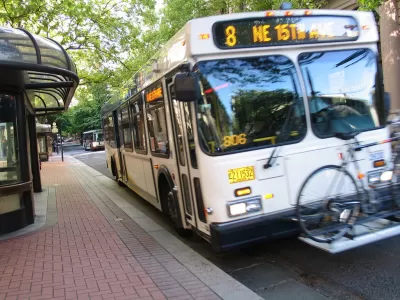Fines will be waived for low-income riders, among other changes aimed at bringing "fairness and equity" to TriMet's enforcement system.

The Board of Directors of TriMet has restructured the way the agency penalizes fare evasion.
Currently, riding without fare is punishable by a $175 fine. Beginning in July, fines for adult riders will be assessed in tiers corresponding to the number of prior offenses, with $175 as the highest. Community service will also become an option in lieu of payment, with required hours determined by a similar tier structure.
Additionally, fare citations will be waived for adult riders eligible for TriMet's low-income fare program (launching concurrently with the new penalty system), or the existing Honored Citizen program for senior and disabled riders.
"The changes are in response to criticism that fare evasion charges disproportionately affect minorities and unnecessarily pushes too many of them into the criminal justice system," Jim Redden of Portland Tribune reports. Similar concerns have prompted changes to fare enforcement strategies in New York, Cleveland, Washington state, and California. In Portland, an internal study found "no systemic racial bias" in TriMet's fare enforcement, but noted that pushing people into the court system over the low-level offense could "affect a person's ability to get a job, rent a house or serve in the military."
FULL STORY: TriMet changes fare evasion penalties

Planetizen Federal Action Tracker
A weekly monitor of how Trump’s orders and actions are impacting planners and planning in America.

Chicago’s Ghost Rails
Just beneath the surface of the modern city lie the remnants of its expansive early 20th-century streetcar system.

San Antonio and Austin are Fusing Into one Massive Megaregion
The region spanning the two central Texas cities is growing fast, posing challenges for local infrastructure and water supplies.

Since Zion's Shuttles Went Electric “The Smog is Gone”
Visitors to Zion National Park can enjoy the canyon via the nation’s first fully electric park shuttle system.

Trump Distributing DOT Safety Funds at 1/10 Rate of Biden
Funds for Safe Streets and other transportation safety and equity programs are being held up by administrative reviews and conflicts with the Trump administration’s priorities.

German Cities Subsidize Taxis for Women Amid Wave of Violence
Free or low-cost taxi rides can help women navigate cities more safely, but critics say the programs don't address the root causes of violence against women.
Urban Design for Planners 1: Software Tools
This six-course series explores essential urban design concepts using open source software and equips planners with the tools they need to participate fully in the urban design process.
Planning for Universal Design
Learn the tools for implementing Universal Design in planning regulations.
planning NEXT
Appalachian Highlands Housing Partners
Mpact (founded as Rail~Volution)
City of Camden Redevelopment Agency
City of Astoria
City of Portland
City of Laramie




























